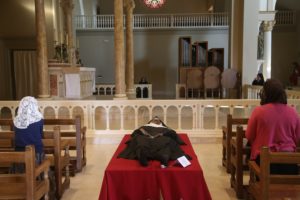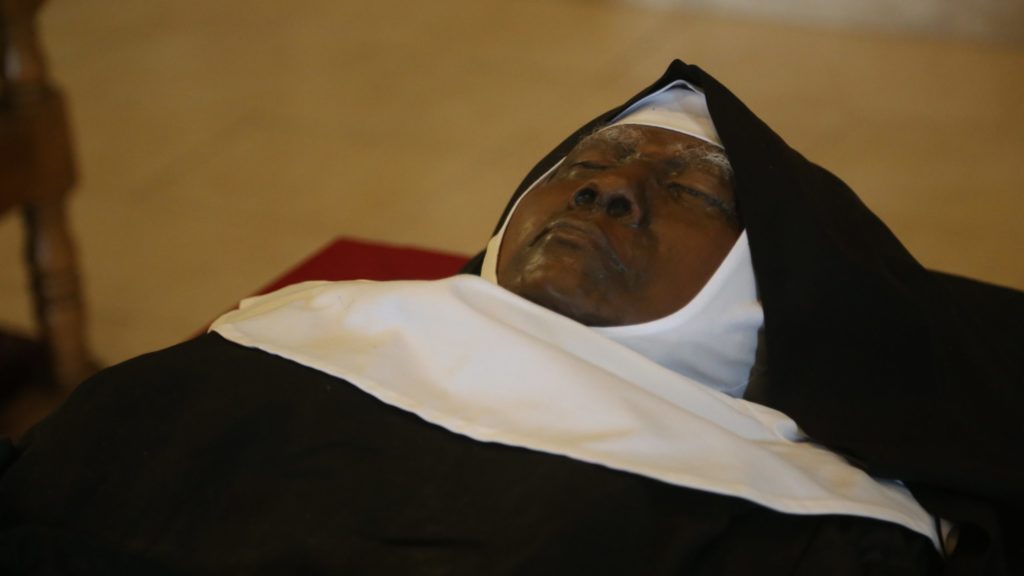The recent discovery of a Black American nun's apparently incorrupt remains in Missouri highlights the rich heritage of Black Catholics in the U.S., experts told OSV News.
During an April 28 exhumation, the body of Benedictine Sister Wilhelmina Lancaster of the Most Holy Rosary -- foundress of the Benedictine Sisters of Mary, Queen of the Apostles, in Gower, Missouri -- was shown to be little changed since her May 2019 death at age 95.
The congregation, which had sought to transfer the remains to its new shrine altar honoring St. Joseph, was stunned to find that except for a layer of dirt and mold, both body and religious habit were intact -- despite a lack of embalming, an in-ground burial in a wooden coffin, and "a puddle of water" on the grave, the religious community said in a informational handout provided at its abbey.
Incorruptibility has long been regarded as a divine sign of sanctity in both Catholic and Orthodox tradition, and the bodies of more than 100 canonized saints have been seemingly untouched by decay.
Cleaned and protected with wax, Sister Wilhelmina's remains are now on display for veneration at the monastery. Following a May 29 rosary procession, the body will be encased in glass at the altar shrine, the religious community stated, adding that once devotion to Sister Wilhelmina has become "well established," her cause for canonization "may be introduced."
In a May 22 statement, the Diocese of Kansas City-St. Joseph, Missouri, acknowledged the body's condition has "understandably generated widespread interest and raised important questions." At the same time, the diocese stressed the need to "protect the integrity of the mortal remains … to allow for a thorough investigation."
As word has spread, hundreds of pilgrims have been flocking to the monastery to gently touch and pray before the body of a woman whose life story -- along with those of three other African American nuns now on the path to sainthood -- "embodies the fundamental truth that Black history is and always has been Catholic history in the U.S.," said Shannen Dee Williams, associate professor of history at the University of Dayton, Ohio, and author of “Subversive Habits: Black Catholic Nuns in the Long African American Freedom Struggle.”
Currently, six Black Catholics have active canonization causes: Mother Mary Elizabeth Lange (1784-1882), foundress of the Oblate Sisters of Providence, of which Sister Wilhelmina was a member prior to founding her own order; Venerable Henriette Delille (1813-1862), foundress of the Congregation of the Sisters of the Holy Family; Julia Greeley (born between 1833 and 1848; died 1918), a former slave who promoted devotion to the Sacred Heart of Jesus; Sister Thea Bowman (1937-1990), who converted to Catholicism as a child and entered religious life as a Franciscan Sister of Perpetual Adoration; Venerable Pierre Toussaint (1776-1853), a former slave who became an entrepreneur and philanthropist; and Venerable Augustus Tolton (1854-1897), a former slave who became the first known black Catholic priest from the United States.

Williams told OSV News that Sister Wilhelmina -- born in 1924 as Mary Elizabeth Lancaster in St. Louis -- was "a descendant of enslaved Black Catholics" who grew up "during the Jim Crow era," a period spanning the 1870s-1950s when various laws in Southern U.S. states enforced racial segregation.
In a pamphlet released after her death, Sister Wilhelmina said her parents had founded a Catholic high school for Black students until the archbishop at the time "put an end to segregation of Negroes in the diocese."
Sensing a call to religious life since childhood, the future nun graduated from high school and immediately entered the Oblate Sisters of Providence.
One of eight historically Black orders in U.S. history, the Oblate Sisters stand as both "the nation's and the modern world's first Roman Catholic sisterhood established by African-descended women," said Williams. "From the early 19th century, the Oblate Sisters of Providence preserved the vocations of hundreds of Black Catholic women and girls called to religious life, but barred admission into white orders solely on the basis of color and race in the U.S., Canada, Latin America and the Caribbean."
The Oblate Sisters later "gave rise to three additional orders," Williams said: the Sisters, Servants of the Immaculate Heart of Mary; the Franciscan Handmaids of the Most Pure Heart of Mary; and the Benedictine Sisters of Mary, Queen of the Apostles, which Sister Wilhelmina founded in 1995.
The community began with the assistance of the Priestly Fraternity of St. Peter in the Diocese of Scranton, Pennsylvania, as the Oblates of Mary, Queen of Apostles. The community moved to a rural area in the diocese of Kansas City-St. Joseph in 2006 at the invitation of Bishop Robert W. Finn, changing its name to the Benedictines of Mary, Queen of Apostles. Originally established as a public association of the faithful, the community was elevated in 2014 to the status of Religious Institute of Diocesan Right. In 2018, the community's priory gained official recognition as an abbey. The following year, the community established its first daughter house in Ava, Missouri. The sisters worship in Latin using the form of the Mass promulgated prior to the Second Vatican Council and chant the psalms using the 1962 Monastic Office.
Sister Wilhelmina's establishment of an "interracial, contemplative Benedictine community" underscores the uniqueness of her story, which "bridges racial divides in the Catholic Church, especially within more traditional communities," said Williams.
Sister Wilhelmina's mysteriously preserved remains also reaffirm the universal call to holiness, said Father Stephen Thorne, a priest of the Archdiocese of Philadelphia and a consultant and special projects director for the National Black Catholic Congress in Baltimore.
"In the midst of all the skepticism, disunity and sinfulness, people are still drawn to holiness," Father Thorne told OSV News. "We need that."
And as the nation's Black Catholics prepare to gather in July for the National Black Catholic Congress – convened at various intervals since 1889 -- Father Thorne said he is looking forward to reflecting more deeply on Sister Wilhelmina's life.
"We will share it in sacred time" at the congress, he said. "It's another reminder that all people are called (by the Lord), African American and Black people as well."

